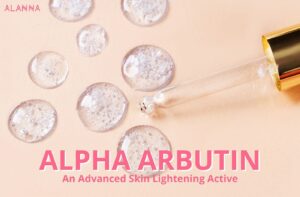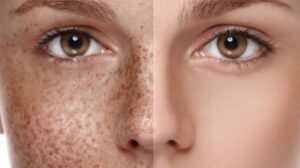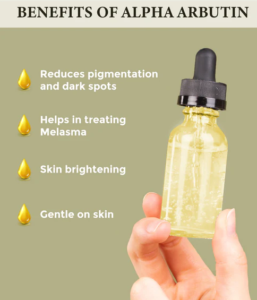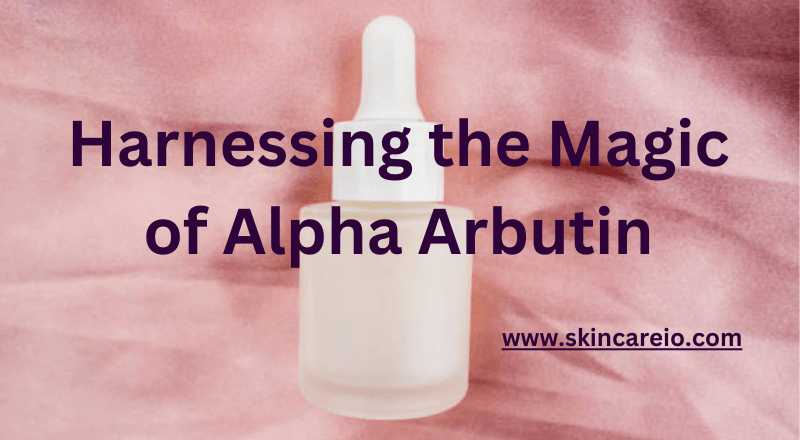Alpha arbutin is a skincare ingredient that has gained popularity in recent years for its potential to address various skin concerns, particularly those related to hyperpigmentation and skin brightening.

In this comprehensive guide, we will explore the general usage of alpha arbutin for the skin, its mechanisms of action, the benefits it offers, and tips for incorporating it into your skincare routine.
Understanding Alpha arbutin:
- Alpha arbutin is a natural compound derived from the bearberry plant and is a close relative of hydroquinone, a well-known skin-lightening agent.
- Alpha arbutin is often used in skincare products for its skin-brightening properties without the potential risks associated with hydroquinone.
- One of the key advantages of alpha arbutin is its ability to inhibit the production of melanin, the pigment responsible for skin color.
- By doing so, it can effectively reduce the appearance of dark spots, melasma, age spots, and other forms of hyperpigmentation, resulting in a more even and radiant complexion.
Mechanism of Action:

Alpha arbutin works by interfering with the enzyme tyrosinase, which plays a crucial role in the production of melanin. When tyrosinase is inhibited, the production of melanin is reduced, leading to a gradual lightening of dark spots and an overall evening out of the skin tone.
Read Also: Retinol: Your Key to Youthful Skin
Compared to other skin-lightening agents like hydroquinone, alpha arbutin is considered a safer alternative, as it is less likely to cause irritation, redness, or rebound hyperpigmentation when used as directed. It is also suitable for individuals with sensitive skin.
Benefits of Alpha Arbutin for the Skin:

The use of alpha arbutin in skincare products offers several significant benefits for the skin;
Alpha arbutin is highly effective at reducing the appearance of hyperpigmentation, including dark spots, sunspots, age spots, and melasma. It can result in a more even skin tone and a brighter complexion.
Safe for Various Skin Types:
Alpha arbutin is suitable for a wide range of skin types, including sensitive skin, as it is less likely to cause irritation or adverse reactions compared to some other skin-lightening ingredients.
Melasma Management:
Alpha arbutin is particularly useful in managing melasma, a skin condition characterized by brown to gray-brown patches on the face. It can help lighten the melasma and prevent its recurrence.
Sun Damage Repair:
Alpha arbutin can assist in addressing some of the effects of sun damage, such as sunspots and uneven skin tone. However, it should always be used in conjunction with sunscreen for optimal results.
Anti-Aging Benefits:
By promoting a more even skin tone and reducing the appearance of dark spots, alpha arbutin can contribute to a more youthful and radiant complexion.
Hydration:
Some alpha arbutin-containing products may also include hydrating ingredients to help maintain the skin’s moisture barrier, resulting in plumper and more supple skin.
Reduced Redness:
Alpha arbutin’s skin-brightening properties can help reduce redness caused by conditions like post-inflammatory hyperpigmentation (PIH) or rosacea.
How to Incorporate Alpha Arbutin into Your Skincare Routine:
To reap the benefits of alpha arbutin for your skin, it’s essential to incorporate it effectively into your skincare routine. Look for skincare products that contain alpha arbutin as an active ingredient.
These products can include serums, creams, lotions, and even spot treatments. Select a product that suits your skin type and addresses your specific concerns. Before applying alpha arbutin to your entire face, perform a patch test.
Read Also: Unlocking Kojic Acid’s Power
Apply a small amount of the product to a discreet area of skin (e.g., behind the ear or on the forearm) to check for any adverse reactions or allergies. Consider how alpha arbutin fits into your overall skincare routine.
It can be used in conjunction with other skincare products, such as cleansers, toners, and moisturizers. However, be mindful of other active ingredients you may be using, such as retinol or vitamin C, and ensure they are compatible.
Alpha arbutin can be used both in the morning and at night, depending on your preference and the specific product’s instructions. Some people prefer to use it in the morning to address concerns like sunspots, while others incorporate it into their nighttime routine.
Alpha arbutin can make your skin more sensitive to UV radiation, so daily use of broad-spectrum sunscreen with at least SPF 30 is crucial. Reapply sunscreen throughout the day, especially if you’ll be outdoors.
To see noticeable results, use alpha arbutin-containing products consistently. It may take several weeks or even months to achieve the desired improvements, especially in cases of melasma and stubborn dark spots.
If you have specific skin concerns or are unsure about how to incorporate alpha arbutin into your skincare regimen, consider consulting a dermatologist or skincare professional. They can provide personalized guidance and recommendations based on your unique needs.
Conclusion:
Alpha arbutin is a powerful and versatile skincare ingredient known for its ability to address hyperpigmentation and promote skin brightening. Its mechanisms of action, safety profile, and compatibility with various skin types make it a valuable addition to many skincare routines. By following the tips mentioned above and being patient in your skincare journey, you can harness the benefits of alpha arbutin to achieve a more even, radiant, and youthful complexion. Whether you’re looking to reduce the appearance of dark spots, melasma, or uneven skin tone, alpha arbutin can be a game-changer in your pursuit of healthy and vibrant skin.
